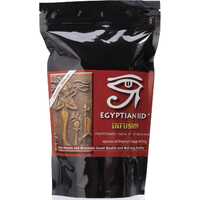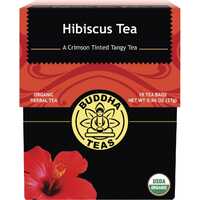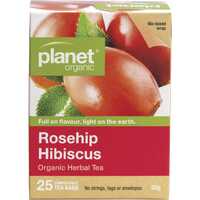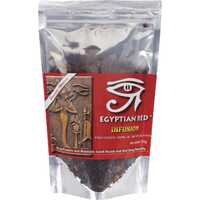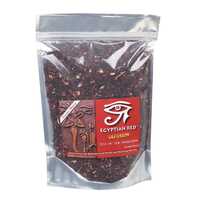Hibiscus tea, a remarkable beverage derived from the Hibiscus sabdariffa plant, stands out not only for its delightful fruity, tangy, and sweet flavour but also for its rich history in traditional medicine and food across various cultures [1]. With its roots in tropical climates, this caffeine-free drink, also known as sour tea, has been celebrated for its medicinal properties, ranging from treating high blood pressure to aiding digestion [1][2]. Ancient civilizations such as Egypt recognized its potential in combating fever and heart issues, underscoring the timeless appeal and health benefits of hibiscus tea [2].
As modern science begins to echo what traditional practitioners have known for centuries, hibiscus tea emerges as a powerhouse of health benefits. Its consumption is associated with a plethora of advantages including lower blood pressure, reduced triglycerides, and weight loss, making it a sought-after elixir for those looking to enhance their metabolic health and boost their immune system [1]. Furthermore, its rich content of antioxidants and anti-inflammatory properties contributes to the regulation of cholesterol levels and supports the management of conditions such as diabetes and fatty liver [1][2].
What is Hibiscus Tea?
Hibiscus tea, a delightful and healthful beverage, is crafted from the dried calyces of the Hibiscus sabdariffa plant. This herbal tea is recognized for its deep red colour and uniquely tart, cranberry-like flavour, which can be enjoyed either hot or cold [5][7]. Known globally under various names such as sorrel tea, agua de Jamaica, and karkade, hibiscus tea is cherished not only for its taste but also for its cultural significance in various regions [8][9][10][11].
Preparation Methods:
- Traditional Steeping: The classic method involves steeping dried hibiscus calyces in boiling water for about 10-15 minutes, which extracts their vivid colour and full flavour [4].
- Using Fresh Flowers: For a more artisanal brew, fresh hibiscus flowers can be used. The process includes separating leaves from the flower, thoroughly washing them, and then steeping the petals in boiling water for 3-4 minutes. This method is often enhanced by adding flavours such as honey and lemon juice [3].
Global Variations and Cultural Practices:
- Senegal: Hibiscus tea is so popular it's considered the national drink [5].
- Egypt and Sudan: It plays a significant role in wedding celebrations, where it's customary to toast with a glass of hibiscus tea [5].
- Mexico and Central America: Here, it's commonly referred to as 'agua de flor de Jamaica' and is enjoyed for its refreshing qualities [5].
- Thailand: Typically served cold, heavily sweetened, and poured over ice [5].
- Italy: Known as carcadè or karkadè, it is usually consumed hot with sugar and lemon juice added for extra flavour [5].
This tea's versatility and rich cultural heritage make it a beloved choice in many households around the world. Its preparation varies slightly from region to region, each adding a unique twist to the basic recipe, reflecting local tastes and traditions.
Health Benefits of Hibiscus Tea
Cardiovascular Health:
- Blood Pressure Management: Hibiscus tea has been consistently shown to lower both systolic and diastolic blood pressure, with the most significant reductions observed in individuals with pre-existing elevated levels [1][12][13].
- Cholesterol and Triglycerides: It effectively reduces levels of LDL (bad) cholesterol and triglycerides, while potentially increasing HDL (good) cholesterol. This contributes to a lower risk of cardiovascular diseases [1][7][12].
Metabolic and Liver Health:
- Weight Management: Regular consumption of hibiscus tea supports weight loss efforts, attributed to its ability to prevent fat absorption and reduce the formation of new fat cells [1][7].
- Liver Function: Hibiscus extract has shown promise in improving liver steatosis and reducing markers of liver damage, suggesting its potential in promoting liver health [7].
Antioxidant and Anti-inflammatory Properties:
- Disease Prevention: The high levels of antioxidants, including vitamin C and anthocyanins, help protect cells from damage and may reduce the risk of chronic diseases such as cancer and diabetes [1][2][8].
- Anti-inflammatory Effects: These properties help in managing inflammation-related conditions and could aid in the treatment of ailments like arthritis and heart disease [1][8].
Additional Health Benefits:
- Hormonal Balance: Hibiscus tea may help in balancing hormones, which could alleviate symptoms associated with PMS and menopause, although further research is required to fully establish these effects [1].
- Kidney and Digestive Health: Acts as a natural diuretic, enhancing the body's ability to excrete excess sodium and water, which helps in managing blood pressure and supports kidney function [1][7].
Safety and Interactions:
- Medication Interactions: Individuals on medications such as acetaminophen or hydrochlorothiazide should consult healthcare providers due to potential interactions [1].
- Considerations for Specific Groups: Pregnant and lactating women, as well as those consuming high amounts of hibiscus extract, should seek medical advice due to possible adverse effects, including potential liver toxicity at very high intake levels [1].
Hibiscus tea's rich profile in health-promoting compounds makes it a valuable addition to a healthy lifestyle, offering benefits that span across various aspects of bodily health. However, as with any supplement or herbal tea, moderation and consultation with a healthcare provider are advised to avoid any adverse effects.
Nutritional Profile of Hibiscus Tea
Hibiscus tea, celebrated for its vibrant colour and tangy flavour, also boasts a rich nutritional profile that contributes to its numerous health benefits. Here is a detailed look at the essential nutrients found in hibiscus tea:
Vitamins and Minerals:
- Vitamin C: Known for its antioxidant properties, hibiscus tea offers trace amounts of vitamin C, which supports the immune system and skin health [1][4][8].
- Minerals: Each serving of hibiscus tea contains essential minerals including calcium, magnesium, phosphorous, and potassium. These minerals are crucial for bone health, nerve function, and overall cellular function [1][8][9].
Antioxidants and Polyphenols:
- Anthocyanins: Hibiscus tea is rich in anthocyanins, a type of antioxidant that helps fight free radicals, potentially reducing the risk of chronic diseases like heart disease and cancer [8].
- Polyphenols: The tea is also noted for its high polyphenol content, which has significant antioxidant properties. In fact, hibiscus tea has been ranked number-one in antioxidant content, surpassing even green tea [13].
Nutritional Composition of Fresh Hibiscus Calyces:
- Calories and Macronutrients: One cup of fresh hibiscus calyces contains approximately 28 calories. This includes 0.5 grams of protein and 6.5 grams of carbohydrates, with negligible fat content [8].
- Micronutrients: Additionally, this serving size provides a good source of calcium, magnesium, phosphorous, potassium, vitamin A, and vitamin C, which are vital for maintaining various bodily functions [8].
This comprehensive array of nutrients makes hibiscus tea not only a delightful beverage but also a potent contributor to a healthy diet. Whether enjoyed hot or cold, incorporating hibiscus tea into your daily routine can offer a delicious way to boost your nutritional intake.
How to Incorporate Hibiscus Tea into Your Diet
Incorporating hibiscus tea into your diet can be a delightful and healthful addition. Here are some practical ways to enjoy this tangy beverage:
1. Basic Hibiscus Tea Recipe:
- Ingredients: Half a cup of dried hibiscus flowers, 8 cups of water, honey to taste, lime to taste [2].
- Preparation: Boil water and add dried hibiscus flowers. Let it steep for 15 minutes. Add honey and lime to taste. Strain and chill in the refrigerator for a refreshing cold drink or serve it hot [2].
2. Daily Consumption for Weight Management:
- To aid in weight loss, drink 3 to 4 cups of hibiscus tea daily, preferably half an hour before meals. This helps in managing appetite and enhancing fat metabolism [1].
- For optimal results, incorporate it into a balanced diet and regular exercise routine, replacing high-calorie drinks with hibiscus tea [1].
3. Creative Combinations:
- Enhance Flavors: Add elements like fresh lemon juice, ginger, cinnamon, or mix with green tea to enrich the flavor profile and increase health benefits [1].
- Cooking and Baking: Use brewed hibiscus tea as a liquid ingredient in recipes to add a unique flavor and color to dishes and desserts [1].
By integrating hibiscus tea into your daily routine and culinary practices, you can enjoy its numerous health benefits while indulging in its distinct, refreshing taste.
Conclusion
Through the exploration of hibiscus tea's roots, spanning various cultures and its established place in traditional and modern health practices, we've delved into the reasons behind its growing popularity. The benefits of this vibrant, tangy beverage extend far beyond its refreshing taste, offering a myriad of health advantages from boosting cardiovascular health and aiding in metabolic processes to its potent antioxidant properties. The careful blend of scientific research and traditional knowledge presents hibiscus tea as not just a simple beverage but a holistic elixir for improving general well-being.
As we conclude our journey into understanding hibiscus tea, it's clear that its inclusion in your diet can be more than just a matter of taste—it's a conscious step towards enhancing your health. Whether enjoyed as a cooling refreshment or a warm, comforting drink, hibiscus tea stands as a testament to nature's capability to nurture and heal. While it is wonderful as part of a dietary routine for its nutritional benefits, it is key to remember moderation and the importance of consulting with healthcare professionals, especially for those on medication or with specific health considerations. Encapsulating culture, history, and health, hibiscus tea undoubtedly earns its place as a cherished beverage worldwide.
FAQs
1. What are the benefits of drinking hibiscus tea daily?
Drinking hibiscus tea regularly can offer several health benefits. It is known to help lower blood pressure, support heart health, and provide antioxidants. Many people enjoy its refreshing flavor and feel it contributes positively to their overall health.
2. Are there any restrictions on who should avoid hibiscus tea?
Individuals with low blood pressure or those who are taking certain medications should be cautious about drinking hibiscus tea. Its effects during pregnancy are also not well understood, so it may be best to avoid it in such cases.
3. Is it better to drink hibiscus tea in the morning or at night?
Hibiscus tea can be enjoyed at any time of the day as it is caffeine-free. However, due to its soothing and relaxing properties, many find it beneficial to drink in the evening or before bedtime. It can be served hot or chilled, depending on your preference.
4. What are the potential side effects of consuming hibiscus?
Hibiscus is generally safe when consumed in food amounts and possibly safe in medicinal quantities. Drinking hibiscus tea up to 720 mL daily for up to six weeks has been used safely. However, some people might experience minor side effects such as stomach upset, gas, or constipation.
References
[1] - https://www.medicalnewstoday.com/articles/318120
[2] - https://www.myteadrop.com/blogs/news/hibiscus-tea-benefits
[3] - https://www.eatingwell.com/article/7989695/health-benefits-of-hibiscus-tea-according-to-a-dietitian/
[4] - https://fdc.nal.usda.gov/fdc-app.html#/food-details/171946/nutrients
[5] - https://en.wikipedia.org/wiki/Hibiscus_tea
[6] - https://www.republicoftea.com/blog/tea-library/what-is-hibiscus-tea/tl-024/
[7] - https://www.healthline.com/nutrition/hibiscus-tea-benefits
[8] - https://www.webmd.com/diet/hibiscus-tea-is-it-good-for-you
[9] - https://tecompanytea.com/blogs/tea-atelier/hibiscus-tea
[10] - https://www.teatulia.com/tea-varieties/what-is-hibiscus.htm
[11] - https://health.clevelandclinic.org/benefits-of-hibiscus
[12] - https://www.ncbi.nlm.nih.gov/pmc/articles/PMC9086798/
[13] - https://nutritionfacts.org/topics/hibiscus-tea/


 Certified Organic
Certified Organic Vegan Friendly
Vegan Friendly  Vegetarian
Vegetarian Organic Ingredients
Organic Ingredients Dairy Free
Dairy Free Gluten Free
Gluten Free Keto Friendly
Keto Friendly


























